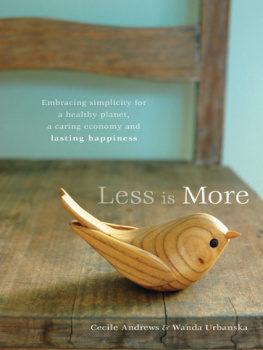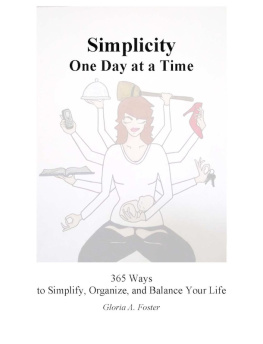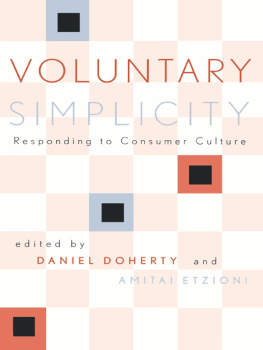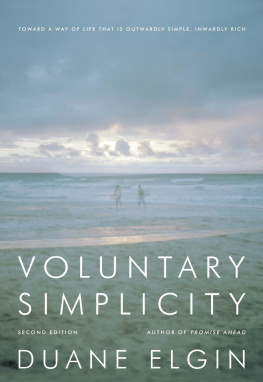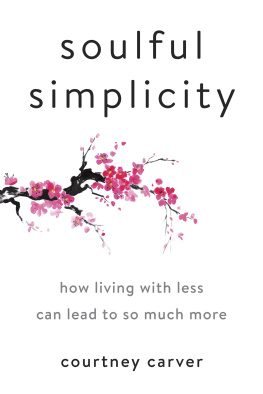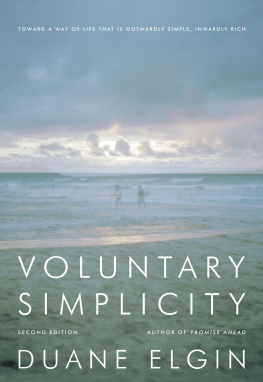The mass of men lead lives of quiet desperation.
H ENRY D AVID T HOREAU
Joans job was beginning to take up her whole life. She thought about it all the timeusually with a tense, sick feeling in her stomach. And it was not that she was the CEO or anythingjust a vice president for an HMO. She just didnt have a feel for what might happen next: would her budget get cut, would her boss bring her another emergency project to be done yesterday, would she even keep her job?
All the cutbacks. She thought her job was secure, but so had Susan. What was Susan going to do now? She and Dave had spent everything they earned, using their five-year-old daughters college fund for the down payment on the new house.
She hadnt really talked to Susan lately, except to leave voice mail messages about having lunch. Actually, she hadnt seen many of her friends this year. She just couldnt face the effort of having people to dinnercleaning her house, going through the piles of clutter, or cooking! And it probably wouldnt be any fun anyway; lately there was so much back-biting among her friends at work.
Besides, when could they do it? On Saturdays she and Joel tried to get out of towneven if they took briefcases full of work with them. Theoretically, they left town to spend some time together, but they both kept calling their voice mail, returning calls to everybody else who was catching up on office work. They might as well stay homethe calls would be cheaper.
She had never really worried about money, but lately she had been running up billsbuying things she didnt need, like those new shoes and the bread maker. Bread maker! That was a joke. Another kitchen appliance that would never get used.
Shed been tired a lot, too, and Joel seemed to be particularly irritating lately. Whenever they were together he was always sneaking a look at his watch. She wondered if other couples had such paltry sex livesfalling into bed exhausted at midnight didnt help. They hadnt laughed in a long time, either.
It was the rushing around that drove her crazy. She couldnt seem to stop, even on the weekends. She wished she could just sit and stare into space.
But the worst thing was the Sunday night dread. She would think about Monday morning and work, and her stomach would tighten and jaw muscles clench. Actually, it would start on Saturday, when she wondered whether she could get all her errands done. Shed think: Am I enjoying my time enough? Do I dare go for a walk, or should I do the laundry? The only time she felt free was on Friday night, and she was too tired to enjoy it. Theyd be asleep on the couch by 8:30, the television blaring.
Was this it? Wasnt there something more?
A lot of people feel like Joanrushed and frenzied and stressed. They have no time for their friends; they snap at their family; theyre not laughing very much. But a growing number of people arent content to live this way. They are looking for ways to simplify their livesto rush less, work less, and spend less. They are beginning to slow down and enjoy life again.
Theres a movement associated with thisits called the voluntary simplicity movement. Around the country, thousands of people are simplifying their lives. They are questioning the standard definitions that equate success with money and prestige and the accumulation of things. They are returning to the good life.
People are attracted to this movement for a lot of different reasons. Many are looking for more time. Some are looking for ways to save money, to find techniques for living on less. Most are searching for more meaning. Almost all are concerned about the environment, for they realize that our lifestyle is leading to the destruction of nature. Theyre all searching for ways that help them feel excited about life when they awake each morning, ways that help them find joy in the moment, a sense of purpose in their work, ways that help them feel a sense of connection with all of life.
People are moving more slowly, savoring their time, lingering over their meals, conversing with their friends. Listen to their voices:
For me, voluntary simplicity is living consciously, trying to eliminate the unnecessary, the superficial clutter. It is trying to live morally and ethically in the global economy by using less.
I think of voluntary simplicity as living on purpose, making sure I have the time to do the things I want to do, not wishing my time away.
I think that voluntary simplicity is being true to yourself, true to the environment. Its finding that place for every facet of my life and defining how much is enough. For me it is spiritual.
Its choosing to enhance ones life by surrounding yourself with what really brings you fulfillment. Its defining my own standard of success and prosperity, community and fun.
Voluntary simplicity is balancing the realities of my life (limited economics, time, and energy) with my values and implementing them into a lifestyle that is comfortable and rewarding. I think voluntary simplicity is an art of living. I believe it is an art to live, to be true to who you are and to be open to innovation.
These are the words of people in simplicity circles, people of all ages and backgrounds who sense there is a better way than trying to change on their own.
A lot of people are realizing that just reading a book or going to a workshop isnt enough. They get fired up for a few weeks and then they slip back into their old habits. To make lasting, profound changes, people are joining simplicity circles. Simplicity circles are small groups of people who gather together, without experts or authorities, to help each other simplify their livesto support each other, to think together, to exchange ideas on ways to live differently. When youre working with like-minded people, talking with kindred spirits, exploring with people who share your values, its easier to make changes.
A NEW APPROACH TO LEARNING
I became involved in the voluntary simplicity movement in the same way many have. I was working all the time but I was beginning to enjoy it less. My work was beginning to grow stale. As a community college administrator, the director of continuing education, I had always thought that I could do important things by developing stimulating, thought-provoking classes for people. But it was getting harder and harder, and I was feeling discouraged and bored.
One year, I had an experience that set my life on a new course. It began with Fall Convocationthe start of another community college school year.


